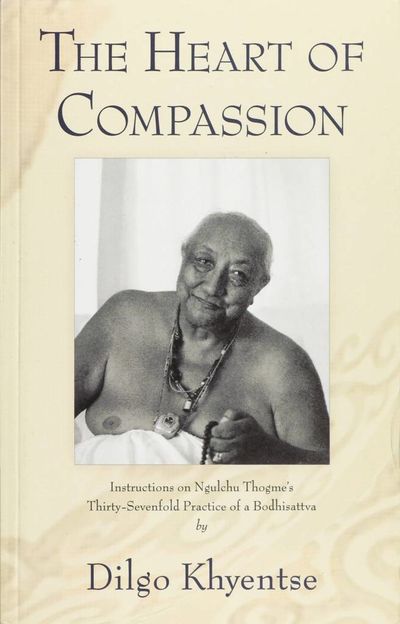No edit summary |
No edit summary |
||
| Line 1: | Line 1: | ||
{{Book | {{Book | ||
|FullTextRead=No | |FullTextRead=No | ||
|BookToc=Translator's introduction 9 | |BookToc=* {{i|Translator's introduction|9}} | ||
Gyalse Ngulchu Thogme (1295-1369) 11 | * {{i|Gyalse Ngulchu Thogme (1295-1369)|11}} | ||
THE | |||
THE COMMENTARY 37 | * {{i|THE ROOT TEXT|27}} | ||
INTRODUCTION 39 | * {{i|THE COMMENTARY|37}} | ||
OPENING VERSES 44 | |||
Homage 44 | ** {{i|INTRODUCTION|39}} | ||
** {{i|OPENING VERSES|44}} | |||
PART ONE | *** {{i|Homage|44}} | ||
First, the need to give meaning to this human existence of yours, so rare and difficult to obtain 51 | |||
Second, an exhortation to abandon your native land, the source of the three poisons 58 | ** {{i|PART ONE – THE PREPARATION|51}} | ||
Third, a recommendation to live in solitary places, the source of all good qualities 60 | *** {{i|First, the need to give meaning to this human existence of yours, so rare and difficult to obtain|51}} | ||
Fourth, to reflect on impermanence, in order to give up the concerns of this life 63 | *** {{i|Second, an exhortation to abandon your native land, the source of the three poisons|58}} | ||
Fifth, the need to avoid unsuitable friends, being with whom creates adverse circumstances 68 | *** {{i|Third, a recommendation to live in solitary places, the source of all good qualities|60}} | ||
Sixth, to rely on a spiritual teacher, whose presence creates conditions favorable to your progress 69 | *** {{i|Fourth, to reflect on impermanence, in order to give up the concerns of this life|63}} | ||
Seventh, to go for refuge, the entrance to the Buddhist teachings 72 | *** {{i|Fifth, the need to avoid unsuitable friends, being with whom creates adverse circumstances|68}} | ||
*** {{i|Sixth, to rely on a spiritual teacher, whose presence creates conditions favorable to your progress|69}} | |||
*** {{i|Seventh, to go for refuge, the entrance to the Buddhist teachings|72}} | |||
PART Two o THE MAIN TEACHINGS, ILLUMINATING THE PATH 81 | PART Two o THE MAIN TEACHINGS, ILLUMINATING THE PATH 81 | ||
First, the path for beings of lesser capacity 81 | First, the path for beings of lesser capacity 81 | ||
Revision as of 14:59, 20 February 2020
What would be the practical implications of caring more about others than about yourself? This is the radical theme of this extraordinary set of instructions, a training manual composed in the fourteenth century by the Buddhist hermit Ngulchu Thogme, here explained in detail by one of the great Tibetan Buddhist masters of the twentieth century, Dilgo Khyentse. In the Mahayana tradition, those who have the courage to undertake the profound change of attitude required to develop true compassion are called bodhisattvas. Their great resolve—to consider others’ needs as paramount, and thus to attain enlightenment for the sake of all living creatures—carries them beyond the limits imposed by the illusions of “I” and “mine,” culminating in the direct realization of reality, transcending dualistic notions of self and other. This classic text presents ways that we can work with our own hearts and minds, starting wherever we find ourselves now, to unravel our small-minded preoccupations and discover our own potential for compassion, love, and wisdom. Many generations of Buddhist practitioners have been inspired by these teachings, and the great masters of all traditions have written numerous commentaries. Dilgo Khyentse’s commentary is probably his most extensive recorded teaching on Mahayana practice. (Source: Shambhala Publications)
| Citation | Khyentse, Dilgo. The Heart of Compassion: Instructions on Ngulchu Thogme's Thirty-Sevenfold Practice of a Bodhisattva. Translated by Matthieu Ricard and edited by John Canti (Padmakara Translation Group). New Delhi: Shechen Publications, 2006. |
|---|---|


